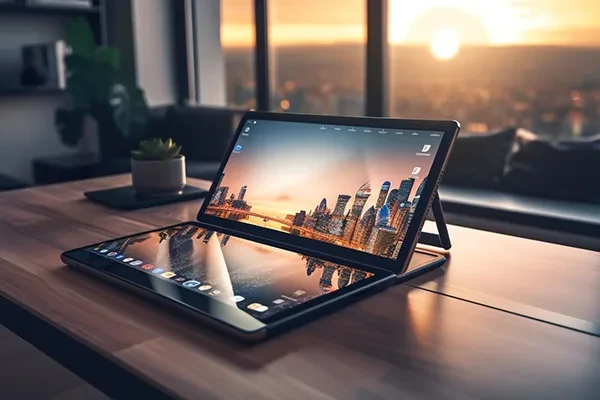What is the Internet of Things (IoT)?
Author: Keane Beaken | Date published: July 25, 2023, UK | Read est: 5 min read
The Internet of Things, or IoT, is a sprawling network where everyday objects - your fridge, your watch, or even your car - can connect to the Internet and share data. For businesses the benefits of IoT are endless, imagine asset tracking, in-vehicle networking for go-anywhere connectivity or the CCTV cameras in your office. In this interconnected digital ecosystem, devices communicate with each other, gleaning insights and making informed decisions in real time. This evolving landscape spans from individuals using smart home devices to multinational corporations leveraging IoT to streamline operations and increase efficiency.
But let's get more granular. It's not just mobiles or laptops: IoT is present in surprising objects, like farm soil sensors, smart trash cans, or even connected toothbrushes. The monetary value of IoT? Gartner forecasts IoT endpoints will top 25 billion by 2023, amounting to a staggering global economic impact in the trillions of dollars.
Why is the IoT important?
IoT creates a powerful feedback loop for businesses to understand consumer behavior and product usage. With IoT data, you can eliminate guesswork, optimise resource usage, and increase efficiency. It's like having a crystal ball that gives you insights on your customers' needs and how your product is serving them.
Furthermore, the line between the physical and digital worlds is getting blurrier, making the transition between the two realms increasingly seamless. The advent of IoT brings us one step closer to that reality.

What technology makes it possible?
The Internet of Things is built on the foundation of several cutting-edge technologies.
At the heart of IoT devices are sensors and actuators. Sensors detect changes in the environment, such as temperature, light, or movement, and turn these into digital data. Actuators, on the other hand, take this digital data and convert it into physical action, like switching off a light or adjusting an air conditioner's temperature.
These devices are connected to the internet, primarily through Wi-Fi, cellular networks, or other IoT-specific communication protocols like Zigbee, LoRaWAN, or Bluetooth. Once online, these devices can communicate, share data, and even collaborate to make complex decisions. This deluge of data, from millions of devices, is then stored and processed in the cloud. Cloud computing platforms provide the necessary storage capacity and computational power to manage this vast data. More importantly, they use advanced analytical tools and machine learning algorithms to extract actionable insights from this raw data.
As the IoT evolves, more technologies are being developed to improve its capabilities and security. These include edge computing, which aims to reduce the latency of decision-making by processing data closer to the source, and blockchain technology, which could provide a more decentralised and secure way to store and verify IoT data.
How can it benefit businesses?
Retail
In the retail industry, IoT offers a myriad of opportunities. Smart shelves fitted with weight sensors can track inventory in real-time, alerting staff when stocks are low. RFID tags on items enable businesses to manage their supply chains more effectively, ensuring that products are always available when customers need them. Interactive kiosks and digital signage can change their messages based on time of day, who’s looking, or even the weather. Personalised advertising, driven by data collected from IoT devices like smartphones and wearable tech, can provide a more tailored shopping experience, increasing customer engagement and loyalty.
Logistics
For logistics companies, the IoT can provide unprecedented visibility into their operations. GPS and other tracking sensors on vehicles, pallets, and packages allow for real-time location tracking, ensuring goods are delivered on time and making lost shipments a thing of the past. IoT devices can also monitor the condition of goods in transit, which is crucial for sectors like food or pharmaceuticals where products need to be kept at specific temperatures. Furthermore, data gathered from IoT devices can be used for route optimization, reducing fuel costs and improving efficiency.
Manufacturing
In manufacturing, IoT can revolutionise the shop floor. Sensors on machines can predict failures before they occur, reducing downtime and maintenance costs – a concept known as predictive maintenance. Wearable IoT devices can ensure worker safety by monitoring their vitals and alerting them of hazardous conditions. IoT can also streamline production processes by providing real-time insights into machine performance and product quality, enabling quick corrections and improvements.
Hospitality
In the hospitality sector, IoT can enhance customer service and increase operational efficiency. IoT-enabled keyless entry allows guests to unlock their rooms using their smartphones, increasing security and convenience. Smart thermostats and lighting can automatically adjust according to guest preferences, enhancing their experience while saving energy. Moreover, connected appliances can alert maintenance staff when they need repairing, ensuring they’re always in working condition.
Healthcare/Medical
In healthcare, IoT has the potential to significantly improve patient care and outcomes. Wearable devices can monitor patient vitals like heart rate, blood pressure, and glucose levels in real-time, enabling early detection of potential health issues. In hospitals, connected devices can automate the administration of medication, reducing errors. Additionally, IoT can enable remote monitoring of patients, reducing the need for hospital visits and freeing up valuable healthcare resources.

What are IoT applications?
The Internet of Things (IoT) has vast applications across numerous sectors, each designed to enhance productivity, efficiency, and ease of life. Let's explore some transformative examples:
Smart cities
IoT is revolutionising urban spaces. Intelligent traffic management systems, energy-efficient street lights, and smart waste management are just a few ways IoT is creating more sustainable and livable cities.
Agriculture
In farming, IoT devices monitor soil and crop conditions in real-time, enabling precision farming. These insights help optimise irrigation and fertiliser use, maximising yields. Livestock health and location can also be tracked, promoting efficient farm management.
Industry 4.0
IoT is integral to the fourth industrial revolution. In manufacturing, it enables predictive maintenance and streamlined inventory management, increasing operational efficiency.
Home automation
From smart thermostats that learn your routines, refrigerators managing your grocery shopping, to keyless entry with smart locks, IoT is making homes smarter and lives more convenient.

What is the future of the internet of things?
The future of IoT lies in building smarter cities, industries, and even nations. As we enter the fourth industrial revolution, IoT and AI will be the driving forces. As everyday objects become more connected, the value of data as a resource will skyrocket.
With IoT SIM cards and other technologies, you can ride this wave to the future. Ignoring IoT isn't an option: fall behind, and the data you have compared to other companies will be sorely lacking. So jump on the bandwagon and let the Internet of Things propel your business into the future.

Keane Beaken
Mobile Director
Keane, with an illustrious 22-year career in the business mobile industry, has been leading the Mobile team at Focus Group for over 15 years. During this time, Keane has been instrumental in building the division into the UK’s leading independent provider of business mobile solutions whilst keeping customer satisfaction front of mind at all times. His extensive experience in the sector has facilitated consistent growth of the business, both organically and through successful acquisitions.